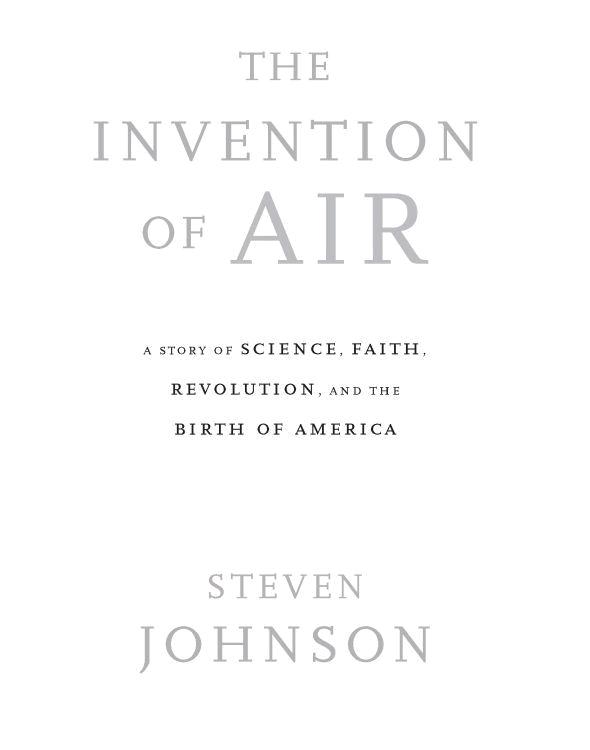
The Invention of Air
A Story Of Science, Faith, Revolution, And The Birth Of America
کتاب های مرتبط
- اطلاعات
- نقد و بررسی
- دیدگاه کاربران
نقد و بررسی

November 10, 2008
Signature
Reviewed by
Simon Winchester
This is an intelligent retelling of a rather well-known story, that of Joseph Priestley, the Yorkshire dissenting theologian and chemist, and then went on to emigrate to America and advised the creators of the new republic—Thomas Jefferson, most notably—on how best to run their country.
Steven Johnson, who has a fine reputation for discerning trends and for his iconoclastic appreciation of popular culture, chooses his topics well. His most recent book, The Ghost Map
, looked at the story—also very familiar—of the London cholera epidemic of 1854, and of the heroic epidemiologist, John Snow, who discovered the ailment’s origins and path of transmission. It was a good story, but essentially a simple one.
With Priestley, Johnson has now taken on a subject that is every bit as complex and multifaceted as any of the Quentin Tarantino films he so admires. Priestley was a scientist, true, and his meditations on the exhalations of gases from mint leaves and the curiosities of phlogiston and “fixed air,” his discoveries of sulfur dioxide, nitrous oxide, ammonia gas—and oxygen, most importantly—and his relationship with his French rival Lavoisier have been the stuff of schoolroom chemistry lessons for more than two centuries.
But it is his politically liberal and spiritually dissenting views that underpin the story that Johnson chooses to tell—views that led in 1794 to Priestley, whose house in Birmingham had been sacked by rioters, emigrating to America, thereby becoming “the first great scientist-exile, seeking safe harbour in America after being persecuted for his religious and political beliefs at home. Albert Einstein, Otto Frisch, Edward Teller, Xiao Qiang—they would all follow in Priestley’s footsteps.”
Johnson unearths an interesting and illuminating statistic: in the 165 letters that passed between Thomas Jefferson and John Adams, the name Benjamin Franklin is mentioned five times, George Washington three times, Alexander Hamilton twice—and Joseph Priestley, a foreign immigrant, is cited no fewer than 52 times. The influence of the man—he was a fervent supporter of the French Revolution, a tolerant stoic and a rationalist utterly opposed to religious fundamentalism—was quite astonishing, and Steven Johnson makes a brave and generally successful attempt to summarize and parse the degree to which this influence infected the founding principles of the American nation.
As a reminder of the underlying sanity and common sense of this country—a reminder perhaps much needed after the excesses of a displeasing presidential election campaign—The Invention of Air
succeeds like a shot of the purest oxygen. Illus. (Jan. 2)
Simon Winchester, author of
The Professor and the Madman, is working on a biography of the Atlantic Ocean.

December 15, 2008
Joseph Priestley (17331804) was a veritable Renaissance man, whose interests and skills ranged from science to religion to politics. Science writer Johnson ("The Ghost Map") weaves together all of these themes and how they played out in his life, in early America, and among the Founding Fathers. He tells the story in a reader-friendly manner that also encourages readers to think about how these themes apply in today's world. This work covers different ground from Jerome D. Bowers's 2007 "Joseph Priestley and English Unitarianism in America" and discusses more of the culture of the times than the more costly but thorough 2008 collection of essays edited by Isabel Rivers, "Joseph Priestley, Scientist, Philosopher, and Theologian". Recommended for all large public and all academic libraries.Eric D. Albright, Tufts Univ. Health Sciences Lib., Boston
Copyright 2008 Library Journal, LLC Used with permission.

December 1, 2008
Johnson uses only some of the important ideas of chemist, theologian, and radical democrat Joseph Priestley (17331804) to revive the liberal doctrine of inevitable progress and grieve that todays progressives are so gloomy. Priestley was hopeful even when mobs torched his house, laboratory, and church; when waterspouts threatened the ship on which he repaired to America (the subject of the crackling prologue); and when his new homeland nearly prosecuted him under the Alien and Sedition Acts. Moreover, he lacked all vanity, selfishness, and guile, freely broadcasting his findings and ideas without a thought of personal gain or political risk. Johnson ensures that we appreciate Priestleys greatest achievementnot the discovery of oxygen but the realization that life on earth is a system of chemical reactionsby enthrallingly tracing the process that evinced it. He also lucidly recounts Priestleys career-making friendship with Benjamin Franklin and how he incensed the torch wielders with his Unitarianism and the Adams administration with his advocacy of French revolutionary principles. His last great friend was Jefferson. Ecology is his developed scientific legacy.(Reprinted with permission of Booklist, copyright 2008, American Library Association.)

























دیدگاه کاربران